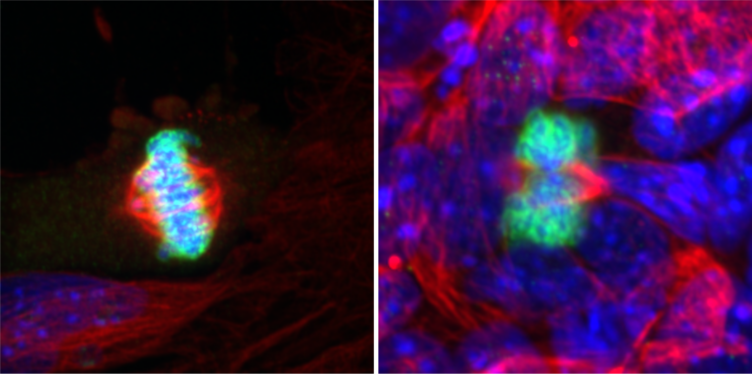This website uses cookies so that we can provide you with the best user experience possible. Cookie information is stored in your browser and performs functions such as recognising you when you return to our website and helping our team to understand which sections of the website you find most interesting and useful.
 Division of an embryonic stem cell (left). Alterations in protein methylation cause defects in cell division (right). / CNIO.
Division of an embryonic stem cell (left). Alterations in protein methylation cause defects in cell division (right). / CNIO.
Protein methylation is a carefully controlled process that occurs in all living things, from the smallest bacteria to humans
Protein methylation is involved in controlling which genes are turned on or off, in DNA repair and in sending signals within the cell, among other functions
The new method shows how methylation affects protein structure
Focusing on methylation could be a promising strategy for developing new treatments
Proteins are like the hardest-working employees of our cells. They perform important tasks that keep our bodies in perfect working order. But the functioning of proteins does not only depend on their basic components, the amino acids. Proteins can undergo changes that affect their function. One of these changes is called methylation, which involves adding a small chemical group, the methyl group, to certain parts of the protein.
Protein methylation is a carefully controlled process that occurs in all living things, from the smallest bacteria to humans. It usually occurs on specific amino acids, such as lysine and arginine, and is carried out by special enzymes called methyltransferases. These enzymes attach methyl groups to specific amino acids, which changes the structure and function of the protein.
Thanks to methylation, embryonic stem cells can develop into the different types of cells in the body
Protein methylation is involved in many important activities within cells, such as controlling which genes are turned on or off, helping to repair damaged DNA and sending signals within the cell. Recent studies have shown that methylation of certain proteins in embryonic stem cells is important for keeping them in a flexible state, where they can develop into different types of cells in the body.
Proteomics has tools that help identify proteins that have been methylated, and give clues about what those changes mean for the protein’s function.
By comparing proteins from different samples, it is possible to find methylation patterns associated with specific processes within cells, or with diseases. This information is invaluable for understanding how protein methylation works in different situations. However, current knowledge of protein methylation is limited, because traditional proteomic technologies only detect a small fraction of proteins that have been methylated.
The new method shows how protein structure changes with methylation
To overcome this limitation, Cristina Sayago, a researcher at the Spanish National Cancer Research Centre (CNIO), and Javier Muñoz, from the CNIO and IIS BIOBIZKAIA, have led the development of a new method called protein thermal profiling, which analyses how the methylation of a protein affects its ability to maintain its structure at different temperatures.
Methylation can change the way proteins interact with other molecules, how they function and how they fold. So by studying how the protein’s stability changes with methylation, scientists can learn more about what the protein does and how it is regulated.
Targeting methylation may be a promising strategy for developing new treatments
In this study, researchers used protein thermal profiling to study embryonic stem cells. They found that methylation is involved in important cellular activities, such as RNA-protein interactions, control of cell growth and division, and chromosome organisation.
The findings of this study have practical applications in cancer research and other diseases where targeting methylation could be a promising strategy for developing new treatments. The approach developed by the researchers can also be used to study other types of changes and modifications that can occur in proteins.
Reference article
Sayago, C., Sánchez-Wandelmer, J., García, F. et al. Decoding protein methylation function with thermal stability analysis. Nat Commun 14, 3016 (2023). https://doi.org/10.1038/s41467-023-38863-1
